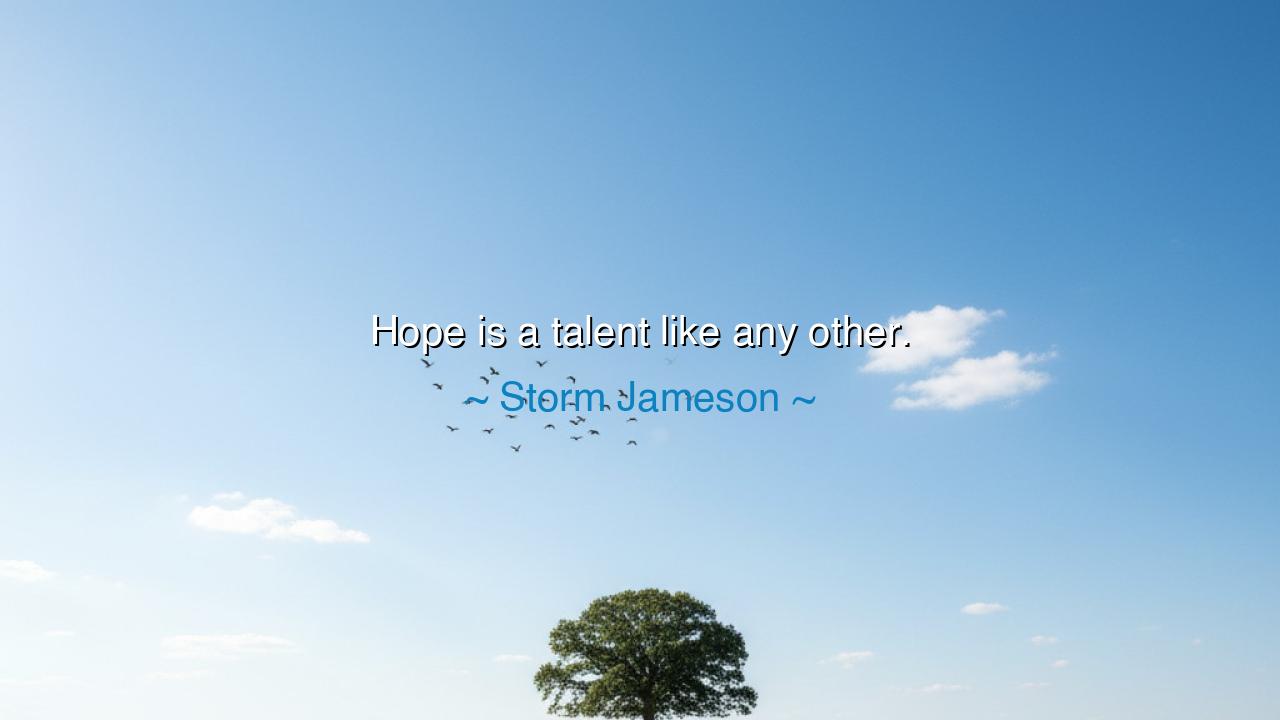
Hope is a talent like any other.






The words of Storm Jameson—“Hope is a talent like any other”—are simple in sound yet vast in depth. They reveal a truth that many forget: that hope is not merely an emotion that visits the heart by chance, but a discipline, a craft, a power to be practiced and strengthened like music or art or speech. In this, Jameson lifts hope from the realm of sentiment and places it among the great human virtues—something to be learned, tended, and guarded. Her insight is not that hope is easy, but that it is earned through will.
In the old days, the wise spoke often of gifts and graces—the talents given to humankind by the divine. To one, the gift of courage; to another, the gift of reason; to another, the gift of song. But Storm Jameson, living through the turmoil of the twentieth century—an age of war and despair—understood that hope itself must be treated as such a gift, not one that descends without effort, but one that must be cultivated like a field. For when the world grows dark, hope does not linger naturally in the heart; it must be built, sustained, and defended as an act of creation.
When she calls hope a talent, she reminds us that it demands practice. The musician’s fingers must bleed before the song becomes beautiful; the sculptor must labor through the stone before form emerges. So too must the hopeful soul train itself to see light in shadow, to rise again after each defeat. This is no passive waiting, but an active art. Hope, in Jameson’s vision, is a craft of endurance, the art of shaping the unseen into something real through faith and effort.
History gives us shining examples of this truth. Consider Nelson Mandela, who spent twenty-seven years behind the cold walls of a prison cell. The world might have expected his hope to die there, yet it became his greatest talent. Day by day, year by year, he honed it as a blacksmith tempers steel. When at last he emerged, his hope had become a force so disciplined and pure that it reshaped the destiny of a nation. His story teaches what Jameson knew: that hope is not the absence of suffering—it is the skill of surviving it without surrendering the spirit.
To see hope as a talent is also to see it as a responsibility. One cannot simply wait for better days; one must learn to make them possible. The one who practices hope trains the mind to search for meaning where others see none, and to build when others only mourn. Just as an athlete strengthens the body, the hopeful person strengthens the will. And like any art, hope requires humility—to keep practicing even when the world gives no applause, even when every note seems lost in silence.
In this way, Jameson’s words stand not as comfort, but as command. She tells us that we are not born hopeful—we become hopeful through work. The child may be given the seed of hope, but the adult must water it daily with action, courage, and imagination. For just as despair can be learned through repetition, so too can hope. The one who trains themselves to expect light eventually sees it; the one who cultivates gratitude, even in pain, finds that strength grows where sorrow once lived.
Let this, then, be the teaching to those who hear: practice hope as you would any craft. When you rise in the morning, choose one act that affirms life—speak a kind word, build something small, look toward what endures. When the world wounds you, do not retreat into bitterness, but turn your suffering into purpose. Like the artist before a blank canvas, return each day to your work—the work of believing that tomorrow can be shaped by your hands.
For in truth, hope is a talent like any other. It may not come easily, but it can be learned. It may falter, but it can be restored. Those who master it become creators not just of art, but of destiny. So train your heart as you would your hands, that when the storms come—and they always come—you will stand not as one who merely endures, but as one who creates hope itself, and in doing so, gives light to the world.






AAdministratorAdministrator
Welcome, honored guests. Please leave a comment, we will respond soon